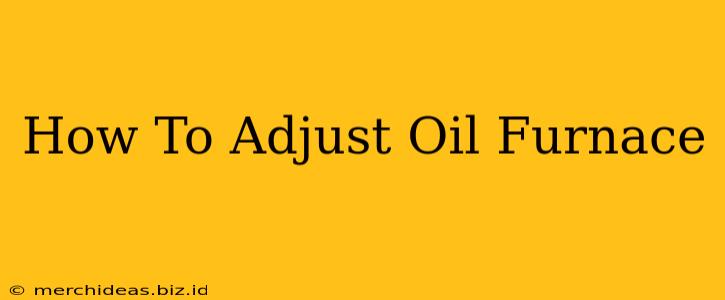Maintaining your oil furnace is crucial for optimal performance, energy efficiency, and safety. While professional servicing is recommended annually, understanding how to make minor adjustments can save you time and money. This guide explains how to adjust your oil furnace, focusing on key components and emphasizing safety precautions. Remember, always prioritize safety and consult a professional if you're uncomfortable performing any of these tasks.
Understanding Your Oil Furnace's Components
Before you start adjusting anything, it's crucial to understand the main components of your oil furnace. Familiarizing yourself with these parts will prevent accidental damage and ensure safe operation. Key components include:
- Burner: This is where the oil is atomized and ignited. Adjustments here impact the flame's shape and size.
- Nozzle: This small component sprays the oil into the combustion chamber. Nozzle size directly impacts fuel consumption and efficiency. Never attempt to adjust or replace the nozzle yourself unless you are a qualified technician.
- Draft Inducer Motor: This motor controls the airflow within the furnace. A faulty motor can lead to incomplete combustion and safety hazards.
- Pressure Switch: This monitors the pressure within the combustion chamber. Incorrect pressure can cause inefficient burning or even safety problems.
- Oil Pressure Gauge: This gauge shows the oil pressure to the burner. Consistent pressure is vital for proper combustion.
Adjustments You Can (and Shouldn't) Make
Some minor adjustments might seem straightforward, but it's crucial to understand the potential consequences.
Adjustments You Can Generally Make (with caution):
- Checking Air Filters: Regularly cleaning or replacing your air filters is the most common and crucial adjustment. A clogged filter restricts airflow, leading to inefficient heating and potential damage.
- Inspecting the Burner: While you shouldn't adjust the burner components, a visual inspection can reveal potential problems like soot buildup or damaged parts. If you see anything unusual, contact a professional.
Adjustments You Should Never Attempt:
- Nozzle Adjustment: Do not attempt to adjust or replace the nozzle. This requires specialized tools and knowledge to ensure proper operation and safety. Improper adjustment can lead to dangerous situations like incomplete combustion, carbon monoxide production, or even fire.
- Burner Adjustments (beyond basic cleaning): The internal workings of the burner are complex and require professional expertise. Adjusting anything beyond basic cleaning can lead to significant problems.
- Draft Inducer Motor Adjustments: This is a critical component for safe operation. Incorrect adjustments can create dangerous pressure imbalances within the furnace.
- Pressure Switch Adjustments: Similar to the draft inducer motor, messing with the pressure switch can result in serious safety risks and inefficient operation.
When to Call a Professional
Despite your best efforts in maintaining your oil furnace, there will come a time when professional help is necessary. Here are some clear indicators:
- Unusual Noises: Loud banging, rumbling, or whistling noises indicate potential problems requiring a professional's attention.
- Inconsistent Heating: If your home isn't heating evenly or the furnace is cycling on and off frequently, it's time to call for service.
- Strange Smells: Unusual odors, particularly the smell of gas or burning oil, are serious safety concerns demanding immediate professional assessment.
- Reduced Efficiency: If your heating bills have significantly increased, it could signal inefficiency requiring professional diagnosis and repair.
Maintaining Your Oil Furnace: A Proactive Approach
Regular maintenance is vital for extending your oil furnace’s lifespan and ensuring efficient, safe operation. Remember, preventing problems is far better than trying to fix them. Regular filter changes and annual professional servicing are essential for optimal performance and safety.
By understanding the key components and limitations of adjusting your oil furnace, you can ensure safe and efficient heating for your home. Remember, when in doubt, always consult a qualified HVAC professional. They possess the expertise and tools to perform necessary adjustments and repairs correctly.
